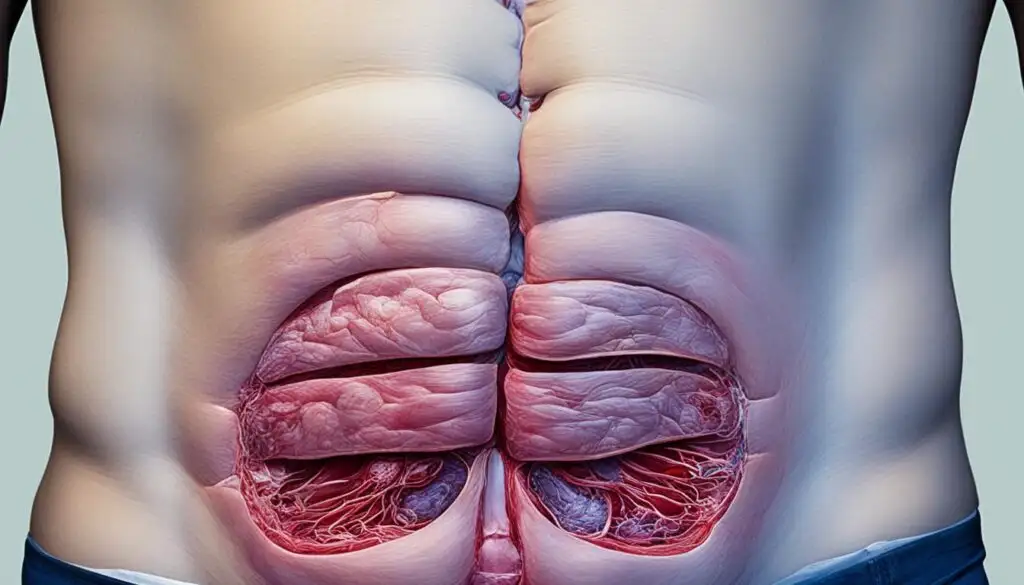Lower abdominal discomfort is a common issue that many people experience. While it often resolves on its own, this discomfort can sometimes indicate a more serious condition that requires medical attention. Understanding the potential causes of lower abdominal discomfort and recognizing when to seek medical help is essential for maintaining your health. This blog will guide you through the different causes, symptoms, and situations where consulting a doctor becomes crucial. We will also discuss specific examples, such as right testicle pain and lower abdomen pain, to provide a comprehensive view.
Understanding Lower Abdominal Discomfort
Lower abdominal discomfort refers to pain or discomfort in the area between the chest and the pelvis. It can be mild or severe, acute or chronic, and might be accompanied by other symptoms like bloating, changes in bowel habits, or urinary issues.
Common Causes of Lower Abdominal Discomfort
- Digestive DisordersDigestive issues are a frequent cause of lower abdominal discomfort. Conditions like irritable bowel syndrome (IBS), inflammatory bowel disease (IBD), and constipation can lead to significant discomfort.
- Irritable Bowel Syndrome (IBS): IBS causes cramping, abdominal pain, bloating, gas, and changes in bowel habits. Stress, certain foods, and hormonal changes often trigger it.
- Inflammatory Bowel Disease (IBD): IBD, including Crohn’s disease and ulcerative colitis, leads to chronic inflammation of the digestive tract. Symptoms include severe abdominal pain, diarrhea, and weight loss.
- Constipation: Difficulty in passing stools can cause pain and bloating in the lower abdomen. A diet low in fiber, dehydration, and lack of physical activity often contribute to constipation.
- Urinary Tract IssuesProblems in the urinary tract, such as urinary tract infections (UTIs) or kidney stones, can cause lower abdominal discomfort.
- Urinary Tract Infections (UTIs): UTIs occur when bacteria enter the urinary tract, causing inflammation. Symptoms include a burning sensation during urination, frequent urges to urinate, and lower abdominal pain.
- Kidney Stones: These hard deposits form in the kidneys and can cause severe pain when they pass through the urinary tract. Symptoms include sharp pain in the lower abdomen or back, blood in the urine, and nausea.
- Reproductive System IssuesReproductive system problems can cause lower abdominal discomfort in both men and women.
- Endometriosis: In women, endometriosis causes tissue similar to the uterine lining to grow outside the uterus, leading to pain, especially during menstruation.
- Ovarian Cysts: These fluid-filled sacs on the ovaries can cause pain and bloating in the lower abdomen.
- Testicular Conditions: In men, issues like testicular torsion or epididymitis can cause pain that radiates to the lower abdomen. For more details on such conditions, you can explore testicle and abdominal pain causes and relief.
- HerniasHernias occur when an organ or tissue pushes through a weak spot in the surrounding muscle or tissue wall. Inguinal hernias, for example, can cause a visible bulge and discomfort in the lower abdomen or groin.
- AppendicitisAppendicitis, or inflammation of the appendix, causes sharp pain that typically starts near the navel and then shifts to the lower right abdomen. It is a medical emergency and requires prompt surgical removal of the appendix.
- Gastrointestinal InfectionsGastrointestinal infections caused by bacteria, viruses, or parasites can lead to symptoms like diarrhea, vomiting, and lower abdominal discomfort. Food poisoning is a common example.
- Musculoskeletal IssuesConditions like muscle strains or ligament injuries in the abdominal area can cause lower abdominal discomfort. Physical activities or accidents often cause these problems.
- Right Testicle Pain and Lower Abdomen PainRight testicle pain that radiates to the lower abdomen can result from various factors, including trauma, infections, or medical conditions. Understanding the connection between testicular and lower abdominal pain helps in identifying the underlying cause.
- Trauma or Injury: Physical trauma to the testicles can cause severe pain that extends to the lower abdomen.
- Epididymitis: Inflammation of the epididymis can lead to pain in the testicle that may radiate to the lower abdomen.
- Testicular Torsion: This is a medical emergency where the spermatic cord twists, cutting off blood flow to the testicle, causing severe pain in the testicle and lower abdomen. Immediate medical attention is necessary.
When to See a Doctor
Knowing when to seek medical attention for lower abdominal discomfort can prevent complications and ensure timely treatment. Here are some situations where you should consult a doctor:
Severe or Persistent Pain
If you experience severe or persistent lower abdominal discomfort that does not improve with over-the-counter medications or rest, you should see a doctor. Persistent pain may indicate a serious underlying condition that requires medical intervention.
Sudden and Sharp Pain
Sudden, sharp pain in the lower abdomen, especially if it is localized to one side, can signal an emergency. Conditions like appendicitis, kidney stones, or testicular torsion require immediate medical attention to prevent complications.
Accompanying Symptoms
Seek medical help if your lower abdominal discomfort is accompanied by other symptoms, such as:
- Fever: A fever along with abdominal pain can indicate an infection or inflammation that needs medical evaluation.
- Nausea and Vomiting: Persistent nausea and vomiting, along with abdominal pain, can be signs of gastrointestinal infections or blockages.
- Changes in Bowel Habits: Significant changes in bowel movements, such as diarrhea or constipation, along with pain, might indicate a digestive disorder.
- Blood in Stool or Urine: Blood in your stool or urine is a concerning symptom that requires immediate medical attention.
- Unexplained Weight Loss: Unintended weight loss along with abdominal discomfort can signal underlying health issues that need investigation.
Pain with Urination or Sexual Activity
Pain during urination or sexual activity, coupled with lower abdominal discomfort, could indicate infections or reproductive system problems. Conditions like UTIs, prostatitis, or pelvic inflammatory disease need timely treatment.
Bloating and Distension
If you experience severe bloating, distension, or a visible bulge in the lower abdomen, it could indicate hernias or other conditions that require medical evaluation.
Recurring Symptoms
If you have recurring episodes of lower abdominal discomfort, it’s essential to consult a doctor to identify the underlying cause and prevent future occurrences. Conditions like IBS, IBD, or recurrent UTIs may need long-term management.

Diagnosis and Treatment
Diagnosing the cause of lower abdominal discomfort involves a thorough medical history, physical examination, and diagnostic tests. Your doctor may use imaging studies, laboratory tests, and other diagnostic tools to identify the problem.
Diagnostic Approaches
- Medical History and Physical Examination: Your doctor will ask about your symptoms, medical history, and perform a physical examination to check for tenderness, swelling, or other abnormalities.
- Imaging Studies: Ultrasound, CT scans, or MRI can help visualize internal structures and identify issues like hernias, kidney stones, or tumors.
- Laboratory Tests: Blood and urine tests can detect infections, inflammation, or other abnormalities.
- Endoscopy: In some cases, an endoscopy might be performed to examine the digestive tract and identify conditions like IBD or gastrointestinal infections.
Treatment Options
Treatment depends on the underlying cause of the lower abdominal discomfort and may include medication, lifestyle changes, or surgery.
- Medication: Antibiotics are used for infections, while pain relievers and anti-inflammatory drugs can manage pain and inflammation. For conditions like IBS, medications to control symptoms might be prescribed.
- Lifestyle Changes: Dietary modifications, stress management, and regular exercise can improve symptoms of conditions like IBS and constipation.
- Physical Therapy: For musculoskeletal issues, physical therapy can help strengthen abdominal muscles and reduce pain.
- Surgery: Conditions like appendicitis, hernias, or testicular torsion may require surgical intervention. Minimally invasive techniques can reduce recovery time and improve outcomes.
Preventing Lower Abdominal Discomfort
Preventing lower abdominal discomfort involves adopting healthy lifestyle practices and being aware of the risk factors for various conditions.
Healthy Diet
- High-Fiber Foods: Include fiber-rich foods in your diet to prevent constipation and improve digestive health.
- Hydration: Drink plenty of water to stay hydrated and support overall digestive function.
- Balanced Meals: Eat balanced meals with a mix of proteins, carbohydrates, and healthy fats to maintain digestive health.
Regular Exercise
- Physical Activity: Engage in regular physical activity to promote healthy bowel movements and reduce the risk of musculoskeletal problems.
- Core Strengthening: Strengthen your core muscles to support your lower abdomen and reduce the risk of injuries.
Stress Management
- Relaxation Techniques: Practice relaxation techniques like deep breathing, meditation, or yoga to manage stress and prevent digestive issues like IBS.
- Adequate Sleep: Ensure you get enough sleep to support overall health and well-being.
Regular Check-Ups
- Routine Medical Exams: Schedule regular check-ups with your healthcare provider to monitor your health and detect any potential issues early.
- Screenings: Participate in recommended screenings for conditions like hernias or reproductive system problems to catch any issues early.
Conclusion
Lower abdominal discomfort can result from various causes, including digestive disorders, urinary tract issues, reproductive system problems, and more. Understanding when to see a doctor for this discomfort is crucial for timely diagnosis and treatment. Severe, persistent, or sudden pain, along with other concerning symptoms, should prompt a visit to your healthcare provider. By addressing lower abdominal discomfort promptly, you can maintain your health and prevent complications.
For more information on specific conditions related to lower abdominal pain, such as right testicle pain and lower abdomen pain, you can visit this detailed guide on testicle and abdominal pain causes and relief.



